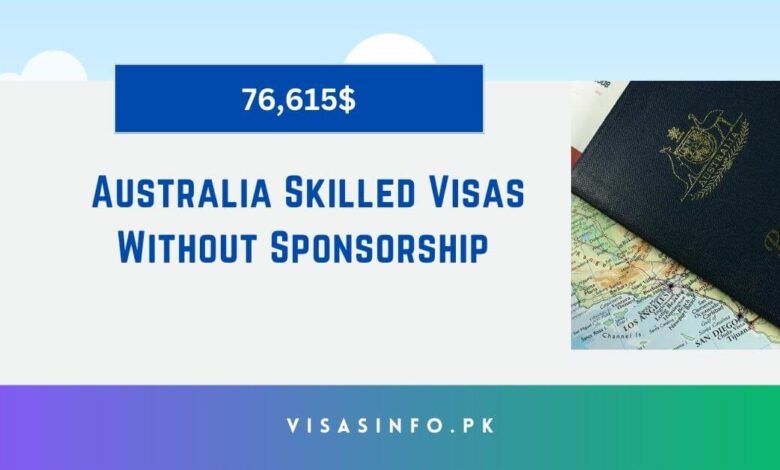Australia Skilled Visas Without Sponsorship – Visit Here

The number of visas allocated for employer-sponsored immigration has significantly decreased, resulting in a significant increase in the competitiveness of Australia’s State and Territory Nominated Visa options. The number of new primary candidates that a state or territory is permitted to nominate in a given program year is known as the Nomination Allocation.
The State and Territory Nominated Scheme will probably become less accessible, resulting in a greater number of potential immigrants opting for alternatives such as Employer-Sponsored Visas.
This article will explore the distinctions between employer-sponsored and non-sponsored pathways, the impact of the limited State and Territory Nominated Visa program on skilled workers, and the process of obtaining an Australia visa without the sponsorship of an employer.
How to Migrate Without Sponsorship
Australia’s permanent skilled migration pool, the State and Territory Nominated visas (including the subclass 190 and 491 visas), the subclass 189 visa, and numerous independent visas are all included in the General Skilled Migration program. Four steps comprise the application procedure for a State or Territory Nominated Visa:
- Submission of an Expression of Interest, passing a point test, and qualification to immigrate under a profession that is in demand in the Australian economy, in addition to obtaining a positive skills assessment. There are numerous methods by which points can be acquired, such as age, English proficiency, prior work experience (both domestically and internationally), and education concluded in Australia.
- A nomination from the government of a state or territory
- The invitation extended by the Commonwealth government
- A visa application for the appropriate visa was submitted to the Department of Home Affairs.
The 190 Visa, in contrast to the 491 Regional Visa, enables applicants to file for permanent residence after three years of living and working in a regional area, irrespective of their international location.
How Reduction in Nominations Affect Skilled Visa Applicants
The number of state and territory nomination positions for the 190 and 491 nominated visas has been significantly reduced across Australia. There will probably be increased competition for positions if there are fewer nominations from states and territories.
Applicants must be cognizant of the fact that they will compete with other potential immigrants who have submitted an Expression of Interest under the same vocation to be considered under the points system.
Check Also: Australia Skills In-demand Visa – Apply Now
State or Territory Nominated Visa
It is not uncommon for an individual to require a score significantly higher than the cutoff, as invitations are typically extended to the highest-ranked candidates in each occupational category. You are still able to immigrate with a state or territory-nominated visa, although it may be beneficial to consult with a registered migration agent first.
They can provide you with professional advice that is tailored to your background, training, and abilities, as well as the states and territories that may necessitate your expertise.
How do Employer-Sponsored Visas compare if your Knowledge and Skills are valued in Australia?
It is feasible that your organization may furnish you with a visa instead of necessitating that you apply for a General Skilled Migration Visa. You may be eligible to obtain a Subclass 186 Direct Entry Stream Visa, a Temporary Subclass 482 (TSS) Visa, or a Subclass 494 Regional Visa as a pathway to permanent residency, contingent upon your qualifications.
Basic information can be obtained from the Visa Tool for Subclass 482 TSS visas and Subclass 494 visas. Employers who may be contemplating the recruitment of competent migrants may be identified through the employment registries maintained by the Australian government. For instance, the skilled migrant employment registration program of the Western Australian state government facilitates communication between companies and skilled laborers in the region’s construction sector.
Benefits of Australia Skilled Visas
- Permanent Residency Pathway: The qualified Independent Visa (subclass 189) and the Skilled Nominated Visa (subclass 190) are among the numerous qualified visas that provide a direct route to permanent residency in Australia. The right to live and work in Australia indefinitely, access to public healthcare, and the ability to petition for Australian citizenship after meeting residency requirements are all provided by permanent residency.
- Work Opportunities in High-Demand Sectors: Australia’s Skilled Visas are designed to attract individuals who possess the necessary talents to pursue positions that are in high demand. This offers visa holders promising employment opportunities, particularly in sectors where qualified labor is scarce. Diverse industries and a robust economy in Australia provide a wide range of employment opportunities.
- Immediate Family Inclusion: Skilled Visas typically permit the inclusion of your immediate family members (spouse/partner and dependent offspring) in your visa application. The same visa status is granted to family members, enabling them to reside, work, and study in Australia. This arrangement ensures the stability and support of the entire family.
- Public Services Accessibility: As a permanent resident in Australia with a Skilled Visa, you are granted access to a variety of public services, such as Medicare, the public healthcare system of Australia. This guarantees that you and your family have access to top-tier healthcare services, thereby alleviating the financial burden of medical expenses.
- Education Benefits: The Australian education system, which encompasses public schools and higher education institutions, is accessible to permanent residents and their families. In comparison to international pupils, certain states and territories also provide permanent residents with reduced tuition fees.
- Australia is renowned: for its exceptional infrastructure, healthcare, education, and social services, which contribute to its high quality of life. The nation is an appealing destination for skilled workers and their families due to its multicultural society, robust economy, and secure and clean environment.
- Flexibility to Live and Work Anywhere: The Skilled Independent Visa (subclass 189) is one of the skilled visas that allows you to live and work anywhere in Australia, allowing you to choose your place of residence and employment. This autonomy can be particularly advantageous if you have a preference for residing in a specific city or region.
- Potential for Regional Incentives: The Skilled Work Regional (Provisional) Visa (subclass 491) is one of the skilled visas that is intended to promote migration to regional areas of Australia. These visas are frequently accompanied by incentives, such as pathways to permanent residency or additional points in the points test, which render them appealing to individuals who are prepared to relocate to areas other than major cities.
- Social Security Benefits: Permanent residents may be eligible for a variety of social security benefits, such as unemployment benefits, family tax benefits, and other social welfare programs, upon satisfying specific residency requirements. This safety net offers financial assistance during periods of hardship.
- Professional Development Support: Australia provides a plethora of opportunities for professional development, such as industry certifications, access to additional education and training, and membership in professional networks. This has the potential to improve your career prospects and facilitate your progression within your selected field.
- Australian Citizenship: Permanent residency is a possibility for skilled visa holders who eventually wish to petition for Australian citizenship. Citizenship provides additional advantages, such as the potential to work in government positions or serve in the Australian Defense Force, access to a complete Australian passport, and the right to vote.
- System Based on Points Transparency: The points-based system utilized for numerous Skilled Visas is transparent and is determined by factors such as age, education, work experience, and English proficiency. This enables applicants to evaluate their eligibility and enhance their prospects of success by satisfying specific criteria.
Why were State and Territory Nominations reduced?
Even though there is still a skills deficit in Australia, there are several potential explanations for the decrease in State and Territory Visa Nominations. The State and Territory Nominated program is probably being reduced in size, even as modifications to its management are being contemplated.
The government recognized that the points test needed to be altered as part of its migration plan to ensure that the emphasis was on factors that would optimize Australia’s productivity and resolve the issues caused by an aging population.
Frequently Asked Questions:
-
Can I apply for a skilled worker visa without sponsorship in Australia?
You don’t need a sponsor for this type of skilled visa. These visas also allow you to work for multiple employers. To apply for these visas, you must first lodge an Expression of Interest (EOI) through the SkillSelect online system. If you are eligible for the visa, we will invite you to apply.
-
Do you need a sponsor to travel to Australia?
The visitor visa (subclass 600) A tourist stream visa also allows you to visit family and friends in Australia without requiring a sponsor.
-
Who is eligible for a skilled worker visa in Australia?
Who is eligible for a skilled visa in Australia? Applicants must be over 18 and under 45 years of age, with excellent English language ability, recent relevant skilled work experience, and qualifications equivalent to Australian standards.



